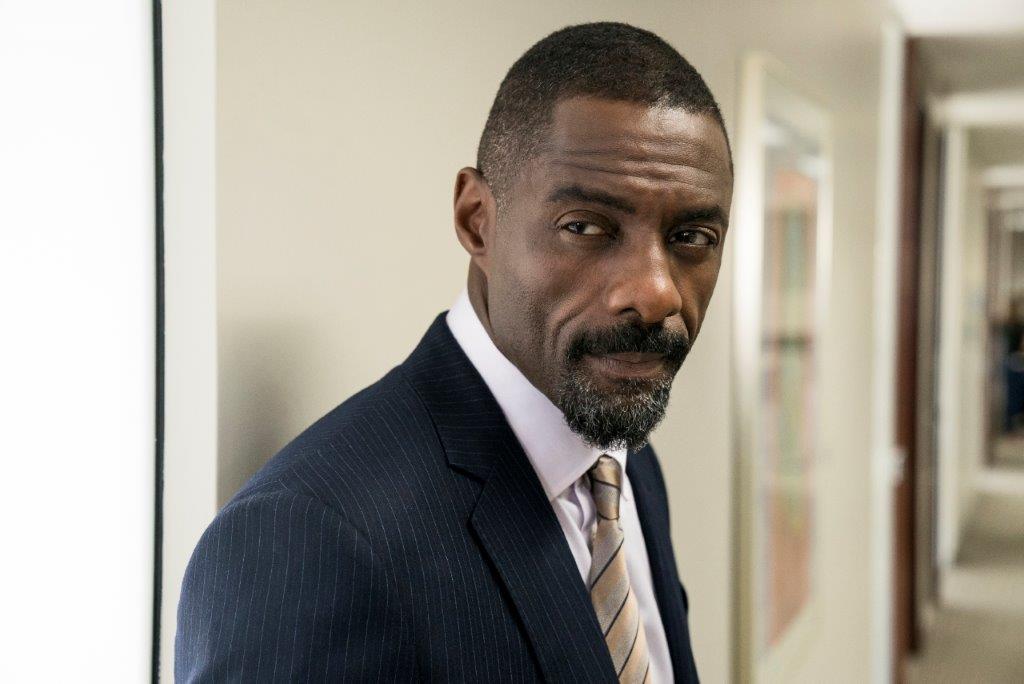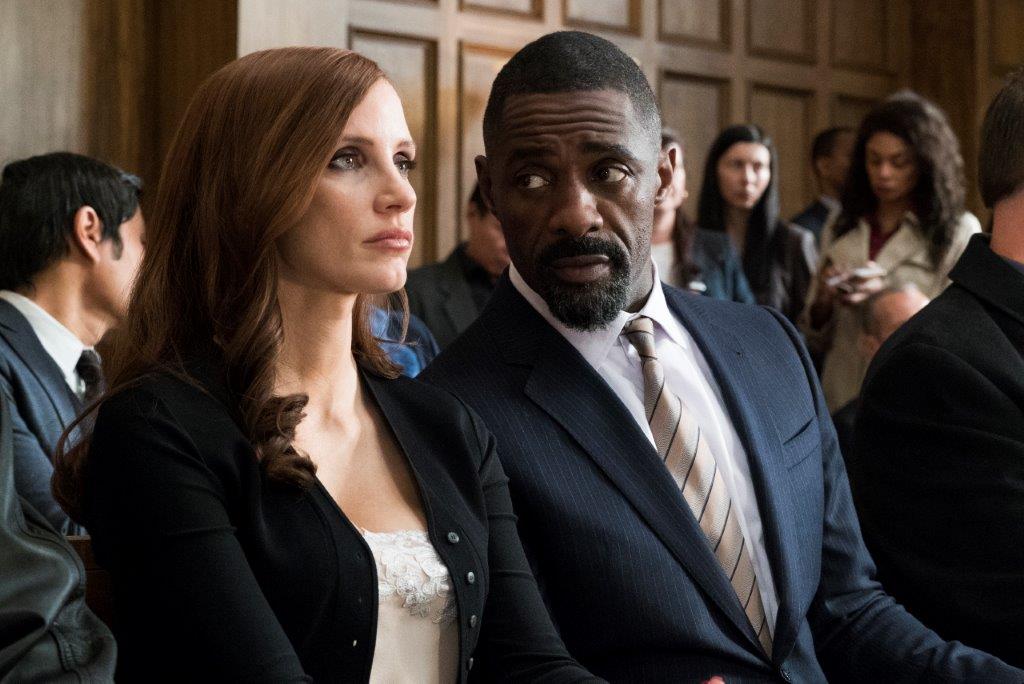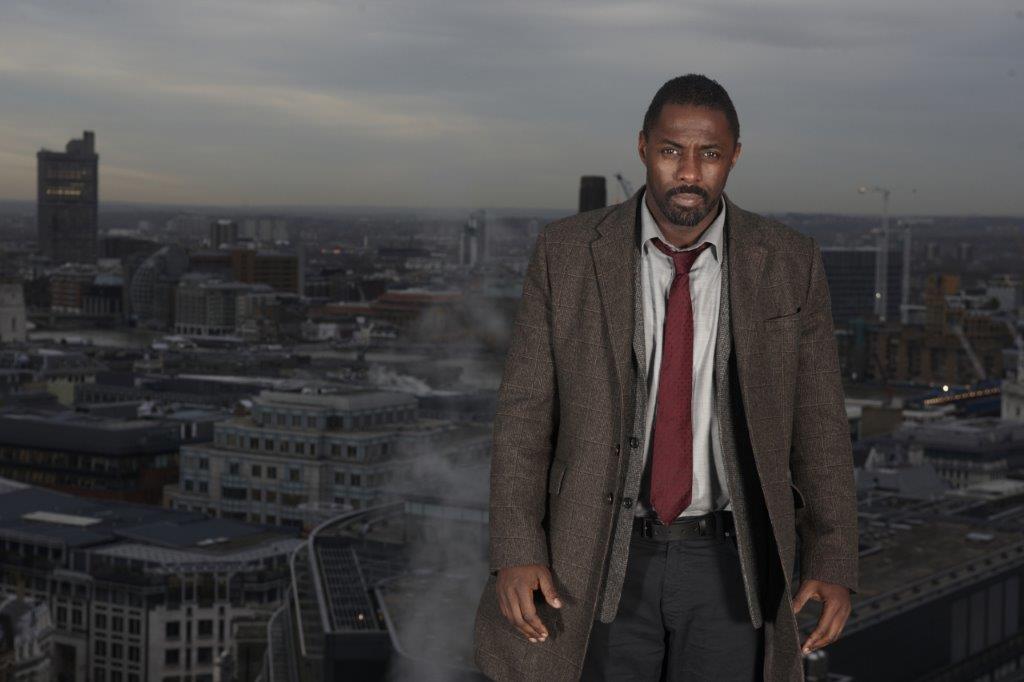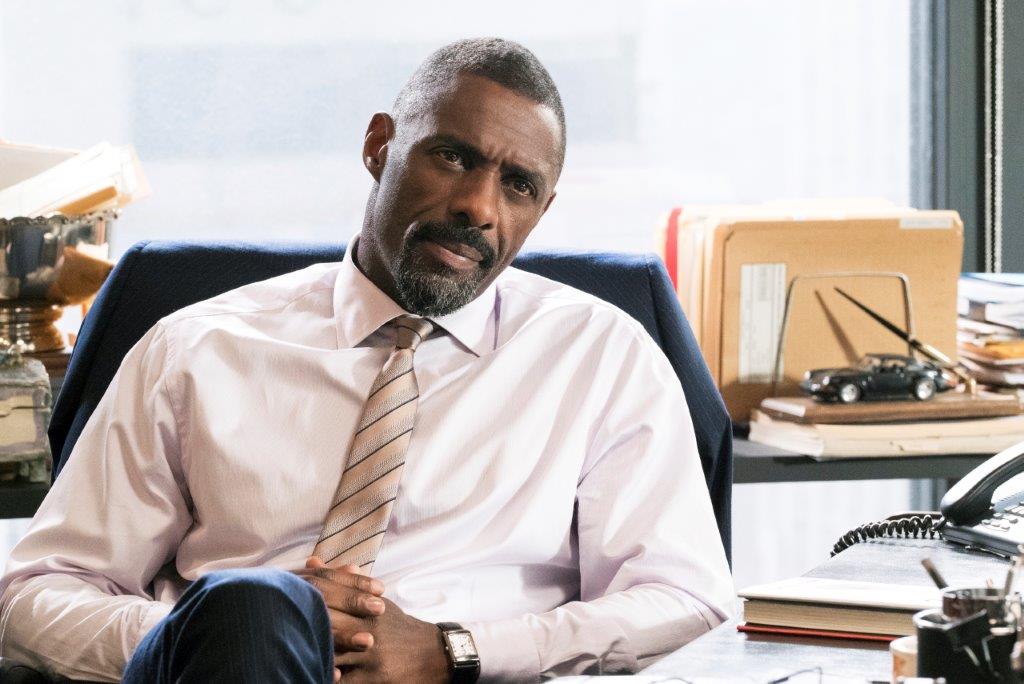by Gill Pringle and Cain Noble-Davies
Having made his first big break in the U.S. playing drug trafficker Stringer Bell in The Wire, British actor Idris Elba has gone on to captivate audiences all over the world. From playing the Norse god Heimdall in the Marvel Cinematic Universe to General Stacker “We’re cancelling the Apocalypse” Pentecost in Pacific Rim, even stepping back into more dramatic roles like The Mountain Between Us with Kate Winslet, Idris has a charisma that few actors working today are able to touch.
Now he puts it to good use as Charlie Jaffey opposite Jessica Chastain’s Molly Bloom in Aaron Sorkin’s directorial debut, Molly’s Game.
Did you grow up mimicking people? Because your accents are so good.
I agonised about doing an accent on Molly’s Game, because the older I get, I’m more self-conscious about the accents. A great actor can do it well; I don’t feel like I can do it as great as people say I can, so thank you for saying that, I appreciate that. I am a little bit of a mimic so, essentially, if I talk to you for long enough, I end up sounding like you a bit. I’ve always been that way. I lived in America for sixteen years, moved back to England and as soon as I got back, I speak how I speak, but as soon as I speak to someone on the phone, it’s like “Hey man, what’s up? Hey, yeah!” And my family are like “What? What is happening? Your accent changes.” I was in Africa making a movie [Beasts of No Nation], and I completely went into full African accent.
Tell us about Molly’s Game. Do you understand the attraction with gambling?
I understand it, it’s about risk. I think men have a different point of view on risk than females. And there is some sort of attraction to, you know, “I make these very calculated risks and double my wealth”. And that’s quite gratifying and satisfying immediately, I get that, but I’m not necessarily a gambler myself. I understand why poker is quite an interesting game, especially to actors, because here you are, looking someone dead in the eye and telling them something that either they believe or shouldn’t believe and then, based on that poker face, you win or lose.
Did you learn to play?
I used to play on an app called Texas Hold ‘Em, just for shits and giggles. But I didn’t learn to play for this film, no. We had a really bottlenecked schedule for this. In the calendar, it was like “And then you go to Aaron Sorkin for twelve days and then you go off and do Mountain Between Us” and I was like “You know that twelve days around Sorkin? Can we just talk about that for a second?” Because, actually, I was training for my fight. I did this documentary about fighting [Idris Elba: Fighter] and I took a year out to train. I didn’t take a year out; I trained for a year and did a professional fight. And literally, the day after that, I flew and came here. And I remember that Aaron’s team were like “Did he win? Did he win? Is he okay? Is he okay?” It was a very crazy little time and then I didn’t have much preparation for Aaron because of my fight schedule. Training twice a day, getting enough sleep and going off and doing this fight. I would read the script, but I didn’t really have the mental preparation. Then I landed, sat down with Aaron and went straight to work.

Why would you want to put your brain at risk with the fighting?
There goes that male thing about risk, you know? There’s something really satisfying that, if I walked away unscathed, I did it. I think it’s midlife crisis, if I’m honest: I’m 45 and I was going through a moment. But there’s something really satisfying that if I could get my body through… it’s optimum and I lost so much weight. When you look at Charlie Jeffey, you can see that I lost a lot of weight. At the time, I was really fight-ready. I was the fittest I’ve ever been. I didn’t look very healthy, actually; when I look at Charlie, his face, and see how drawn I was. But I wanted to do it. I don’t know why, I just wanted to do it. When I was 25, I used to kickbox and loved the training, so I thought “Hey, let’s go for it.”
To play Charlie, did you hang out with any lawyers or did you just have enough of them in your life anyway?
I’ve played lawyers before, so I didn’t do that. I just really trusted in Aaron Sorkin’s words. Aaron Sorkin could have written me as an angel and I would have just gone “Great. Whatever you want me to say.” I knew that Aaron had designed Charlie Jaffey based on some of the thoughts and pre-judgements that he had around Molly. You see that in the way Charlie meets her and he’s like “The Poker Princess”. I relied on Aaron’s guidance in terms of performing. Jessica Chastain was an incredible ally to making this film, because when you’ve got a really good actor that you trust and you’re just going back and forth, it is everything to an actor. In the same way car oil is to a mechanic, you want it, you know it’s great, it makes the engine sound good. Great actor, great words, great director, great team.

You’re also directing Yardie. And you’re not even in it; why?
I wanted to concentrate on just being a director, as opposed to being on the other side of the camera as well. I think, one day, I will direct again and direct myself, but I didn’t want people to be slightly distracted by me being in it and directing it.
What was it that attracted you to it? Did you get the first options on the book [by Victor Headley]?
I was a gun-for-hire; the producers had been trying to develop it for a long time. They came in and said, “Is there something that resonates with you?” I knew the book. It spans from 1973 to 1983, which are the first ten years of my life. Something about that and the music and the culture resonated with me. It’s the beginning of my life, so I felt like I could lens it, I could give an opinion on it. I really enjoyed making the film and I’m still in the process of finishing it now.
Was it interesting working with Aaron, who’s never directed before either? Did you two exchange notes at any point about what this was like?
A little bit, yeah. I told him I was going to go into directing my own movie, and then I was watching, having a keen eye on how he does his work, how he runs his set. And I really got inspired by that. He was incredibly relaxed. But at the same time, he knew what he wanted. But mainly, what was really inspirational is that he kept a happy set. Happy set, happy film.
You mentioned earlier that you moved back to England. Where is home now, and why did you move back?
London is home, but I moved back because my dad was very ill and passed since and I just wanted to be closer to him. I just missed home. I really don’t regret going back. I have a production company now, I’ve given some opportunity to talent in England, so it’s been good.
Speaking about opportunity to talent, you got the Prince’s trust grant which allowed you to travel in the first instance. Did you mention that to the Queen when you received your OBE (Order Of The British Empire)?
Actually, the Queen didn’t give me my OBE, it was Prince William. But Prince Charles definitely knows. I’m actually seeing Prince Charles very soon for a Prince’s trust dinner and… yeah, he definitely knows he gave me that money.
Growing up, did your parents ever do that typical parental advice of “Get a backup job”?
Yeah. I mean, I worked with my dad at Ford for a couple of years, which was… you know, he worked there for 25 years, so it was like “Idris? Acting? Great. But, you know, they don’t make money. You’re gonna be unemployed for a long time, you need to put a roof over your head”, so my dad was very much like that, but he was take-it-or-leave-it with me, didn’t really try to police me. My mum was different: My mum is very opinionated and wants to micromanage, but my dad wasn’t like that.

There must be statistics out there in England about the sale of men’s coats after Luther. It felt like you single-handedly put them back on the market.
They don’t make those coats any more. It’s a Portsmouth coat. It’s an icon now. For a little bit, I worked with Superdry clothing and I had my own line, a collaboration. But it was based on that coat and they liked the coat. I wore it and we ended up designing some coats as well.
Do you want to be Bond?
Doesn’t everybody want to be Bond? I think every Bond actor is pretty much iconic for that role. I have a career where I’m doing everything, you know what I mean? I do acting, directing, music, you know, and I think once you get a character like Bond, that’s your life. It would be an awesome compliment to be offered something like that. It’s not something I’m gonna go out and chase down but it is definitely one of the biggest and most famous rumours that have ever been attached to me. I think I’m more famous for not playing Bond than some actors are for actually playing the character.
Molly’s Game is in cinemas February 1, 2018





As tremendous an actor as Idris undoubtedly is, I’m disappointed he hasn’t rejected the possibility of playing Bond. I’m not a racist but Bond is white. Or isn’t that a permissible thing to say these days? Should a white actor play John Shaft ? Or Luther ? Imagine the furor if those roles were proposed for white actors !